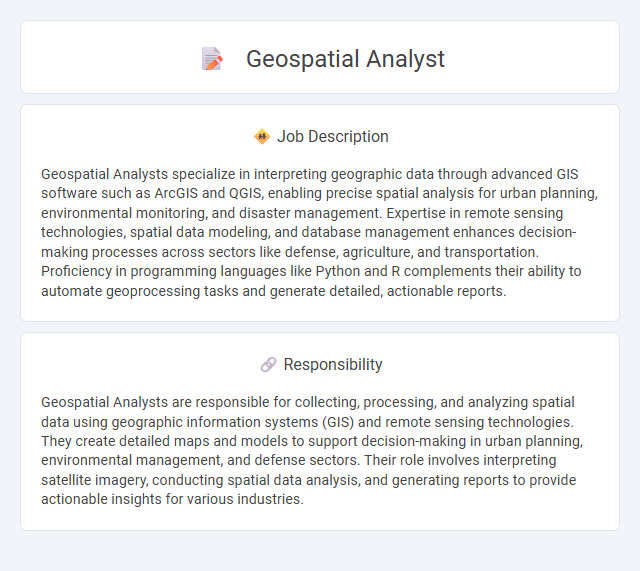
Geospatial Analysts specialize in interpreting geographic data through advanced GIS software such as ArcGIS and QGIS, enabling precise spatial analysis for urban planning, environmental monitoring, and disaster management. Expertise in remote sensing technologies, spatial data modeling, and database management enhances decision-making processes across sectors like defense, agriculture, and transportation. Proficiency in programming languages like Python and R complements their ability to automate geoprocessing tasks and generate detailed, actionable reports.
Individuals with strong analytical skills, attention to detail, and an interest in geography and data interpretation are likely suitable for a Geospatial Analyst role. Those who enjoy working with Geographic Information Systems (GIS) and spatial data may find this job fulfilling and aligned with their strengths. People who prefer a dynamic environment involving problem-solving and technology integration probably have a higher chance of thriving in this position.
Qualification
A Geospatial Analyst requires proficiency in Geographic Information Systems (GIS) software such as ArcGIS and QGIS, alongside strong skills in spatial analysis, data visualization, and remote sensing. A bachelor's degree in geography, environmental science, computer science, or related fields is typically required, with advanced certifications or a master's degree preferred for complex projects. Experience in data management, programming languages like Python or R, and knowledge of cartographic principles are highly valuable qualifications in this role.
Responsibility
Geospatial Analysts are responsible for collecting, processing, and analyzing spatial data using geographic information systems (GIS) and remote sensing technologies. They create detailed maps and models to support decision-making in urban planning, environmental management, and defense sectors. Their role involves interpreting satellite imagery, conducting spatial data analysis, and generating reports to provide actionable insights for various industries.
Benefit
Geospatial Analyst roles likely offer significant benefits such as access to advanced mapping technologies and data analytics tools, enhancing career development and expertise. The position may provide opportunities for collaboration on impactful projects in environmental, urban planning, or defense sectors, potentially increasing job satisfaction. Competitive salaries and the possibility of remote work could also contribute to the appeal of this career path.
Challenge
A Geospatial Analyst is likely to face challenges in interpreting complex spatial data from diverse sources while ensuring accuracy and relevance. They may struggle with integrating large datasets into usable maps and models under tight deadlines. Handling rapidly evolving technology and software updates could also present ongoing difficulties in maintaining expertise.
Career Advancement
Geospatial analysts leverage geographic information systems (GIS) to interpret spatial data, supporting decision-making in industries such as urban planning, environmental management, and defense. Advancing in this career often involves gaining expertise in advanced GIS software, programming languages like Python, and acquiring certifications such as the GISP (Geographic Information Systems Professional). Leadership roles, project management positions, and specialization in emerging fields like remote sensing or spatial data science present key opportunities for career growth.
 kuljobs.com
kuljobs.com